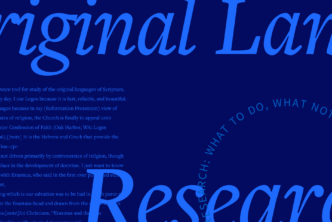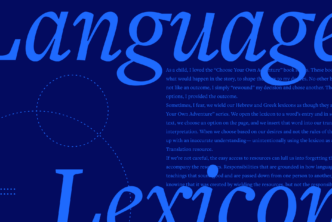The Problem
Few would deny the importance of learning Greek, Hebrew, and Aramaic for teaching and preaching. Despite this high view of the original languages, I’ve heard numerous pastors lament the limited practical payoff of investing seminary time and effort in learning languages. As language skills get rusty, it takes more and more effort to do the kind of passage analysis that the professor recommended. Language study can end up becoming more word study than passage study. This is not a new problem, and it is not going to go away anytime soon. However, I have made it my mission in life to see the receding tide of interest in original language study turned around. The big question is how to do it.
An Idea
While researching the problem, I found that Bible translators had applied modern linguistics to the study of biblical languages in incredibly useful ways. There was a problem, though. Their work was not applied to exegesis, and it was horribly technical. The result: few scholars in biblical studies saw any value in it. I tested out the ideas on students and was surprised with what I found. Yes, linguistics can be complex, and yes, it takes extensive training to be able to completely analyze a discourse. But—and this is a very important but—once students had a basic knowledge of the devices and saw where they occurred in a passage, they were in a much better position to understand the overall flow of the text. So besides just learning the concepts, people needed access to this very specialized data. My mission had gained a bit more focus.
A Solution
I spent the next five years writing my doctoral dissertation and brainstorming a new kind of database. Meanwhile, Logos moved their company headquarters from Oak Harbor, WA, to Bellingham, where I had been living since 1985. I showed them my ideas and waved my arms to describe what my idea would look like. They took a risk, and here’s what’s come about.
- Lexham Discourse Hebrew Bible and Lexham Discourse Greek New Testament: original language databases identifying the most exegetically significant discourse devices and providing a basic propositional breakdown to help you digest the syntax. If you have a basic knowledge of the language—even if it’s very rusty—then these resources will enhance your study.There was a fairly common response to these resources: “Where has this stuff been? Why didn’t I learn this in school?”
- Lexham High Definition Old Testament and Lexham High Definition New Testament: Bob Pritchett, Faithlife’s CEO, gave me a challenge one day. If these ideas are as useful as I claimed, then I needed to design an implementation for folks without any original language background. Get the ideas out of the ivory tower and into the streets.The High Definition OT and NT provide most of the same Hebrew and Greek analysis, but they display it on the ESV text. These resources also come bundled with their original language counterparts.
- Discourse Grammar of the Greek New Testament: After the NT databases shipped, I was often asked how someone could better understand the devices and their relationship to traditional grammar and exegesis. We needed a grammar book designed for folks with a traditional background in Greek. The Discourse Grammar has been endorsed by leading scholars like Dr. Peter Gentry and Dr. Daniel Wallace, and it’s being used at leading seminaries like Southern Seminary, Dallas Seminary, and Knox Theological Seminary.
- Introducing Greek Discourse Grammar: Video Series: After receiving invitations from schools to come and teach a discourse grammar course, we decided to make a video series that provides an overview of the Discourse Grammar concepts using things like funny road signs and jokes to help you better understand how we use language and to show how this understanding can enhance your exegesis. Here are some samples from the series: 1, 2, 3, 4, 5.
- High Definition Commentary: Philippians and Romans: These resources feature infographics that simplify the complex and make the familiar new again. Here is what John Barry, editor-in-chief of Bible Study Magazine, had to say about the Philippians volume.
- Greek New Testament Discourse Bundle: This bundle includes the Lexham Discourse Greek New Testament, Lexham High Definition New Testament: ESV Edition, Discourse Grammar of the Greek New Testament, and the High Definition Commentary: Philippians, along with a collection of essays from leading scholars in discourse studies dedicated to my mentor, Wycliffe translator Stephen Levinsohn. This bundled set saves you nearly $75 compared to buying the resources individually.
Turning the Tide
There is a belief that if you read long enough and widely enough in the original languages after leaving school, you will gain a deeper insight into Greek and Hebrew. While this may be true, the reality is that very few ever reach this level of competency. This is not a practical solution.
The growing suite of Logos discourse resources has been intentionally designed to give you the kind of insights that professors promised. And there are some new discourse projects in the works.
They say “all boats are lifted by a rising tide,” and this holds true for reinvigorating Greek and Hebrew study. Strengthening our exegetical skills will sharpen our understanding of Scripture and our ability to compellingly communicate its message. More effective preaching and teaching will ultimately strengthen the church. The Logos discourse resources represent a significant step forward.





